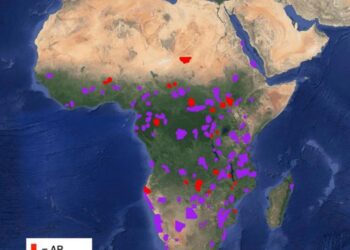The National Center for Supercomputing Applications was recently awarded $4.9 million of supplemental funding from the U.S. National Science Foundation (NSF) for Delta and an additional $4.9 million for DeltaAI to expand the potential capabilities of the soon-to-launch system by nearly 50 percent.
The National Center for Supercomputing Applications was recently awarded $4.9 million of supplemental funding from the U.S. National Science Foundation (NSF) for Delta and an additional $4.9 million for DeltaAI to expand the potential capabilities of the soon-to-launch system by nearly 50 percent.
NCSA originally received nearly $25 million from NSF in 2023 to deploy and operate DeltaAI, an advanced computing and data resource that will be a companion system to Delta. DeltaAI will triple NCSA’s AI-focused computing capacity and greatly expand the capacity available within the NSF-funded advanced computing ecosystem.
“DeltaAI will provide powerful capabilities for simulation and data science, with a strong emphasis on support for AI, which is in growing demand across many fields of science and engineering, said NCSA Director Bill Gropp during the DeltaAI announcement. “This project seeks to expand the use of AI methods in research by providing easier access, training offerings and other support to promote a wider demographic of researchers. These project goals align with our greater mission at NCSA and the NSF effort to democratize high-performance computing.”
The additional funding signals a commitment by NSF to ensure Delta and DeltaAI are premier machine learning and artificial intelligence computing resources for researchers across the country.
We’re excited to launch DeltaAI later this year and see it in action, assisting researchers in their innovative and groundbreaking work. The research community is at the dawn of the next grand AI adventure and we hope Delta and DeltaAI will serve as valuable resources in that journey. NCSA greatly appreciates the collaboration with NSF in providing these types of opportunities for the leading minds in all fields and domains.
Bill Gropp, NCSA Director
A majority of the first round of the recently announced National Artificial Intelligence Research Resource (NAIRR) Pilot projects will utilize allocations on Delta. The supplemental Delta funding will provide additional large GPU memory nodes for research with AI models requiring more than a terabyte of GPU memory.
“NCSA and the Delta team are excited to support the innovative AI projects researchers are undertaking through the NAIRR Pilot,” Gropp said. “The future of artificial intelligence is one of the biggest unknowns facing the academic and research computing communities. NCSA is proud to partner with NAIRR, NSF and the DOE in attempting to find answers to these complex questions and empower AI research in a safe, responsible and equitable manner.”
“This significant new capability will be highly appreciated in the AI community to support the development and training of novel models for science and engineering,” said Volodymyr Kindratenko, director of the Center for AI Innovation at NCSA and a co-principal investigator on the DeltaAI grant. “The system will allow us to routinely work with models with hundreds of billions of parameters, a capability that is currently not available to most academic AI researchers. This addition will have a profound impact on our community.”
NCSA has partnered with NVIDIA to power DeltaAI with the NVIDIA GH200 Grace Hopper Superchip and will play a pivotal role in establishing the National Deep Inference Fabric (NDIF), a collective research platform that will investigate how large language models (LLM) and generative AI operate.
NSF recently awarded Northeastern University $9 million for NDIF which will create a nationwide computing fabric to support scientific experiments on running AI systems while utilizing DeltaAI, an ideal system for designing and deploying new software resources to study LLM inference.
“We’re happy to see so many collaborations already lined up for DeltaAI,” Gropp said. “I can’t wait to see what the future holds for researchers and DeltaAI a short year from now.”
ABOUT DELTA
NCSA combines next-generation processor architectures and NVIDIA graphics processors with forward-looking user interfaces and file systems to create Delta, a powerful computing and data analysis resource that is part of the national cyberinfrastructure ecosystem through ACCESS. The project partners with the Science Gateways Community Institute to empower broad communities of researchers to easily access Delta and with the University of Illinois Division of Disability Resources & Educational Services and the School of Information Sciences to explore and reduce barriers to access. Delta is funded through NSF OAC 2005572.
Discover more from Science
Subscribe to get the latest posts sent to your email.



